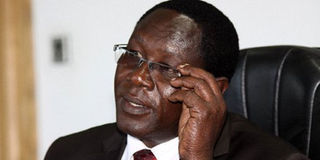Sh74 billion needed to bridge Kenya’s yawning digital divide

Communications Commission of Kenya (CCK) Director-General, Francis Wangusi. Photo/FILE
Kenya must spend at least Sh74 billion to supply telecommunication services to the marginalised parts of the country.
Data compiled by the Communications Commission of Kenya indicates that 72 per cent of all Kenyans do not have access to internet services, 11 per cent do not have access to voice services while 90.5 per cent of former sub-locations do not have a post office.
Sealing these gaps will be a monumental task that will put a strain on government resources dedicated to achieving universal access to ICT services.
Mobile penetration
“The financial burden to extend services to all Kenyans is quite heavy,” said Ms Susan Mochache, the commission’s assistant director of Universal Service Obligation.
The government has set up a Universal Service Fund, which hopes to raise Sh1 billion yearly from the industry to deepen the penetration of mobile and Internet services.
However, if the industry relies purely on this fund to extend services to underserved areas, it could take decades for Kenya to achieve universal access.
The Universal Service Fund’s collection projections for the 2013/2014 financial year at Sh789 million fall short of the expected Sh1 billion.
“We have to be really aggressive to raise funding and perhaps the government has to increase investments” Ms Mochache said.
To complement its collection, the fund has received seed funding of Sh1 billion from the communication commission.
Further, Ms Mochache says that the fund’s mandate will be implemented in tandem with other works geared at universal access such the National Broadband Strategy.
Universal Service Fund will begin work in July following prolonged wrangles between the industry and the communications commission.
Telecom companies have opposed the composition of the fund’s management claiming they had been excluded.
Ms Mochache said that communication firms have formed a committee that will work with the Universal Service Fund board while the regulator works to develop legislation that would allow mobile phone firms to sit on the board.




